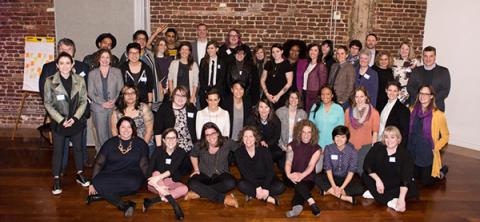
After spending more than half their lives in the music business, selling more than 1 million albums worldwide, twin sisters Tegan and Sara Quin, who perform under their first names only, have launched their own eponymously named Foundation, which “fights for health, economic justice and representation for LGBTQ girls and women.” The pair, who are openly gay, have never shied away from being vocal advocates for LGBTQ equality, something Sara tells Samaritanmag stems from growing up with a strong mother, an activist herself who worked at a sexual assault centre.
Tegan and Sara, 36, have been involved with many causes and charities that help girls, women and the LGBTQ community, including Revel & Riot. As musicians who kicked off their careers in their teens in Calgary, Alberta, they also sit on the board of the Girls Rock Camp Foundation.
Launched in December, the mission for their Tegan and Sara Foundation is “founded on a commitment to feminism and racial, social and gender justice. In partnership and solidarity with other organizations fighting for LGBTQ and women's rights, the Foundation raises awareness and funds to address the inequalities currently preventing LGBTQ girls and women from reaching their full potential.”
Sara spoke with Samaritanmag about a range of issues, from the influence of her mother to being disrespected in the early years of their career to what her plans and hopes are for the Foundation.
Karen Bliss: When you start a foundation, you have to define a mandate, get a clear vision for what you want to accomplish and what’s needed. How did you determine that? Even using the word ‘economic’ is quite different for a foundation or charity.
Sara Quin: The truth is that it has been an incredibly challenging process. As we started to formulize the Foundation and the work we wanted to do, one of the things that we early on had to acknowledge as a group — and we’ve been working with a really amazing foundation partner, the Global Philanthropy Group — and these people you know have over 20 years of experience working in a lot of different areas. I mean, god, they even work with Madonna on her charities in Africa; they work with Kesha and they started the Happy Hippie Foundation for Miley [Cyrus], but one of the things that became really obvious was, even though we think that we narrowed the focus of the work we want to do, when you say “women and girls.” you are looking at an incredibly, diverse, textured group of people who have a lot of different potential struggles, but then also successes and that intersection of feminism, and socioeconomic backgrounds and health, and where do you live, it gets super complicated. There were many days when we were like, “Oh god, do we make the language even narrower?” so that we are not casting to wide a net because we sort of had this mantra of “Let’s do one thing well.” Because we care so much, let’s not do a bunch of things that we can’t really focus on and we can’t really tackle just to say that we did.
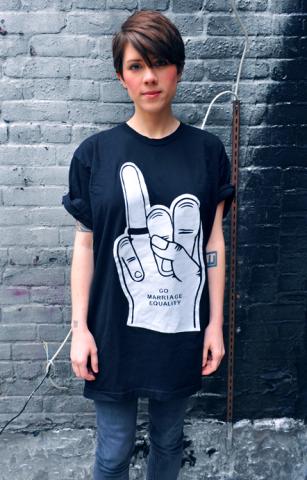
Do you and Tegan differ on any issues that helped narrow it down?
Tegan and I always have a bit of a yin and a yang to work with whatever we do. I tend to — right now anyways —on the rage, frustration and anger spectrum and Tegan is on the “Let’s focus on the positives.” She’s often quick to follow up any sort of discouraging statistics or some of the stuff that we are focusing on that can be challenging and difficult, she’ll follow it up with and “Let’s talk about whether we are having success. Let’s talk about leadership and mentorship,” and I’m like, “Oh god, thank goodness Tegan is here [laughs] because I’m a total downer and a cynic and I think we balance each other that way. We don’t want to be overly fluffy about what we are trying to achieve. Similar to our approach to our band and to our music and our messages, there has to be a balance there, so that we don’t tip over in one direction.
In your teens were you outspoken or as you got more successful as artists became more vocal and aligned with certain charities and causes?
It is tough to give an answer because it’s just age. Certainly we were encouraged when we were young. My mom was a really political, outspoken activist, and went back to school in her 20s when we were kids and was deeply involved in what was happening. Specifically, she worked at a sexual assault centre, so we were out at women’s marches and take back the night marches. Because she worked in social services, whenever funding was cut for the arts, or for nurses or the teachers or welfare or whatever, we were incredibly educated about those things early on. We really saw ourselves as, I guess, a political family so that came up as we were young people, how it intersected with us as teenagers, we would be like, “Oh, well you know what really worked with mom when this thing happened, they started a petition. So at school, when things would get weird, whether it was something to do with teachers or some kind of unfair rule, we would be the kids that would be like, “We don’t have to take this. We can start a petition and let the administration know how we feel.” I’m sure the teachers were driven totally nuts by us, but we enjoyed that goal and had a lot of fun with it and also so it gave us power and gave us a voice as young people.
That is a unique and impactful experience, growing up with a mother like that.
Oh god yeah. Without a doubt. We knew we were from a family that was very unique. I had friends who were older, whose parents I saw as having the same political stamces or were liberal people or socialist people or whatever, but we recognized that our situation was really unique.
We were, in almost every way, our family sort of stood out. My mom was a single parent, but she didn’t necessarily struggle in the way that some of my friends who had single parents were struggling. My mom got student loans and went back to school and really saw herself as strong and independent or at least gave us the impression that she felt strong and independent, and was going to better her life and also was confident and radical about addressing the systemic sexism within the institutions that she was in. I remember being very impacted by that, and I remember her fighting with my father and with my grandfather and my stepfather and having these conversations where she was constantly calling out what she saw were inequities or injustices and, of course, we absorbed all of that and folded that into our own political identities.
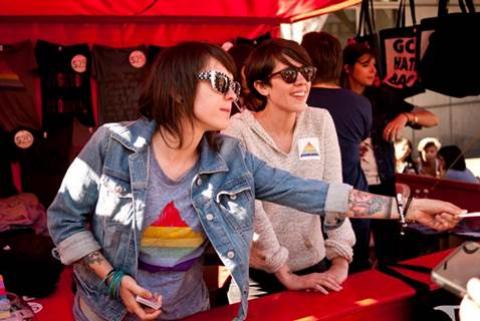
So there were a lot of years where we really struggled with how do we address the stuff that we saw going on and how not to just make enemies or ostracize ourselves, isolating ourselves from the people who we needed. That was a tough time for us, those first, let’s call it, I don’t know, eight years.
Did you experience sexism and homophobia and opportunities that were denied to you, or even just putting up with rudeness and discrimination in that time and you fought through it?
Oh god, yeah. I mean, we still deal with it. I try not to be too judgmental. When I hear people say they don’t experience these things or they don’t see these things, I feel like, “Okay, that’s a person’s experience.” I think that it if you truly haven’t experienced those things, I just think to myself, “My god, you’ve been so lucky” because I don’t think it’s possible.
The truth is that we are also very outspoken and at the time, especially when we started the music business, coming out of the late 90s/early 2000s kind of incredibly gendered music industry where boy bands and rock bands and Eminem and I don’t know, there was something incredibly masculine about men in this really stereotyped way and there was an incredibly feminized girly, heteronormative thing about women and Tegan and I we were not those things. We were queer. We were not only outspoken about our sexuality, but we didn’t look like other women and we didn’t wear makeup and we didn’t allow ourselves to be sexualized in a way that seemed to be instinctive to a lot of people. Even if I look back now, I am like, “My god, we were so gay. We were not playing up our bodies or our sexuality in an overt way, but when you go back and read the press from 17 years ago, it is shocking. It’s shocking what people would write about us, what they would write about our audience. There’s so much fantasy and so much projection of sexuality on us and for women who were teenagers and sisters, it had a shaming effect and it made us really insular and it made us suspicious and uncomfortable with a lot of the music industry.
I could go on and on about the stories of what people have said to us, but then it’s not just men. We all participate in these patterns of homophobia and sexism in this language. Some of the most uncomfortable situations that we have had has involved women. I remember a female radio host asking us on live radio if we were incestuous, if we included it as a part of our live show, being sexually physical with each other.
Okay, that’s ridiculous. That’s crazy.
But it sounds crazy now, but back then this is what we dealt with all the time.
I’ll scratch that question out. Had that coming up next [laughs]
[Laughs]. What is shocking to me now and I think why we didn’t just run to the hills and find a different job was because we didn’t think people were doing it to be cruel. What I mostly felt was “My god no one has any education or understanding about how they are hurting us or how they are hurting other people.” This isn’t like we saw this exclusively as something happening to us. In fact, what was interesting to us was — it is sort of complicated, but it is like we had two very strong narratives enforced by the media, and the industry people around us when we were young. One was constantly being told ‘You’re so lucky. How did this happen to you? You were young, you, like 17 or 18 years old, like how?” Just incredulous.
I would always say, we had become connected to Neil Young through Hayden and his management’ and I was like, “Why don’t people act bewildered and shocked that Hayden was? Nothing against Hayden. I love Hayden, but I was like, “Why are people so surprised?’ like couldn’t we just be that good or have that much potential? So then it became, well, the solution or the answer to that must be “Well, it’s too good to be true. You’re cute lesbian girls. They must’ve seen us as this is a dream.” I can’t even tell you how many hundreds of times we heard like this must be a dream for the record label.
So there was a lot of undoing of those narratives and the way that we were disrespected in my opinion and mistreated for a lot of the first years of our career, and any time we would address it, it was like, ‘oh god, here they go again,’ complaining about this and complaining about that. It is difficult. So I think our activism for the first part of our career, it was sort of private. We put our heads down, like I said we were insular. We toured. We worked our asses off. We supported our community. We always were charitable. We always raised money for organizations that we loved. We were always involved in LGBTQ community.
Probably our private politics were more radical than our band’s politics. I lived in Montreal for 13 years and was dating an activist and was involved in many different organizations and many different groups that I cared about, but there was a public shift for us in 2008, around the Obama election, and Prop 8 in California and the marriage equality movement. All of a sudden it became very clear to us that there was something required of us, that we needed to step up our activism. Although I sometimes feel like celebrity activism, I don’t know how effective it really is, I think that that solidarity or that sort of ally- ship it’s what’s required of us. How can you hold a position of public power and not address things that are going on in the world? I’ve just never been able to make sense of it.
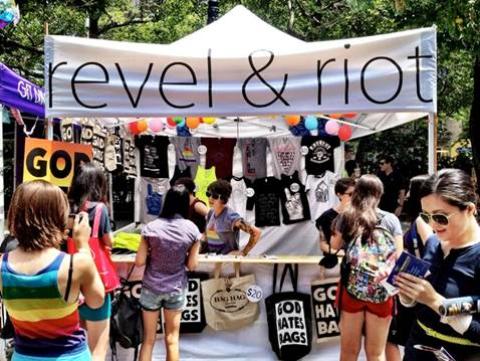
I had an education and understanding of you know the intersectionality of women of colour in our community and that there are so many things happening there. First of all, there’s very little statistics and very little research for women, in general, but when you look at women who are queer or who are women of colour or who are trans women, there’s just actually literally nothing. So it is really tough. A lot of our conversations with, for example, the Williams Institute who provided a lot of statistics and research, they’ll say “I can’t back this up with statistics because there’s really no research, but I can use historical data and other research that we have to hypothesize what’s going on here.”
I think when you are looking at two women living in a household, they are earning less money than men, so that makes sense; they are going to earn less money because they are women and ‘not every lesbian lives in Los Angeles or New York or Toronto or whatever. A lot of women live in places where they can’t be out or they struggle with work or maybe they don’t fit certain gender expressions that allow them to thrive in a society that rewards women for looking a certain way or having a certain sexual currency. We have to assume that there is a compounding effect of not being able to access marriage equality or any of the hundreds of rights that go along with that or benefits or property rights. There are an endless number of things that might have contributed to keeping so many lesbian women in positions of poverty. On top of that, there are so many social and cultural things that impact women.
Right now, we are spending a lot of time in the U.S. so a lot of our data is based on that. Healthcare is obviously a popular topic and people think that everything is perfect in Canada and everything is terrible in America. Still, the healthcare systems works fine down here, but it is expensive and if you get sick it can literally bankrupt you. So if you are already in a position of a precarious, socioeconomic situation and then you get sick I mean it is unbelievable.
So literally every single day we are learning more things and for me it is not a situation where I can’t believe people don’t know this. It is like, “Well, okay, we didn’t necessarily know the inner workinsg of all of these numbers and what they really mean, but we are in a position to address them and to, hopefully, do something about it.
I think that a lot of time, what we think somebody has to do when you are a celebrity, like you literally have to go well beyond what the average person is ever going to do when you are talking about an issue — like it is not good enough to just donate money; it is not good enough to just tweet about something — we almost expect that if you are celebrity you have to become an expert and you have to devote your entire life to it [laughs].
For all the rolling of the eyes that people will do when you talk about Angelina Jolie or Madonna or Shakira, some of the biggest foundations and some of the biggest work that is being done by celebrities is often by women and these women are just not doing this as a vanity project. The money that is being raised, in some cases, hundreds of millions of dollars that would not have been raised if they didn’t care and they weren’t paying attention. I think to myself, sometimes there is such a cynicism around like, ‘Oh god celebrities are getting interested,’ and I’m like, “And raising hundreds of millions of dollars [chuckles]. What are you doing? You put your recycling out every day and pat yourself on the back. Don’t be so cynical my god.”
But then on the other hand, what if someone just tweets about something? Sometimes I’ll think “Is that all that you are doing?’ It’s hard because I don’t know if what is required is that you have to become devoted [laughs], like you are an expert and change the world. I just think it would be nice to see people get involved and care about each other and stretch to think about other people’s community. At this point, Tegan and I not necessarily representative of the community that we are talking about. Tegan and I, we are both certainly not living in poverty and we have done very well for ourselves and we don’t face the kind of discrimination and homophobia and sexism that we once did. We certainly don’t face it in a way that puts us in danger on a daily basis.
In fact, I think that we’ve managed to use those things that were once used against us and actually embrace them and now I think they really work for us. I know that we are not in a position like so many of the people that we interact with, even within our audience who struggle on a daily basis with preserved dignity and safety for themselves. So I’m also very careful. We both are very careful right now to make sure that we are not assuming that we got this, we know exactly what’s happening. it’s sort of why our process has been very education-based and research-based. I want to make sure that we are not speaking for the community as it were, that we completely understand it; we don’t always.
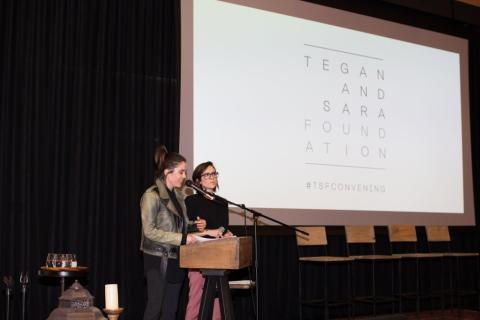
I can answer both those questions because the truth is that we wanted to do the convening because we wanted to be in a room with experts. These were Harvard professors; these were economists; there are some of I think some of the most inspiring and crucial social justice activists in America right now. These people, they have a lot of the answers. They have a lot of the strategies. So for us right now, with the Foundation, it is about amplifying those voices, funding those programs, continuing to be allies and work in solidarity with the people who are already doing amazing work.
On the other side of it, we are looking at very specific areas that we see an opportunity and a gap. Specifically, right now, we are looking at two different programs that would focus on STEM [Science, Technology, Engineering and Mathematics], and specifically tech and getting women into positions at companies and industries that are historically male-dominated, and then leadership and mentorship programs. Our community needs to be supported and we need to support each other. We need to work, especially with women. Sometimes we end up in the individual struggle and we don’t necessarily come together in the community, so we are looking at a lot of networking type stuff, especially for the youths. iI is going to be really important and then focusing on mental and health care.
I think a lot of what we learnt from the convening is that there are amazing people out there; it is just finding them. It is getting people in the right situations, where they have culturally and socially competent doctors and psychiatrists and acupuncturists and wellness people, people who can understand and who are educated and who can be a support. One of the things that figured out through this very early stage of this Foundation is that even from our own personal stories, how many times have we walked into a doctor, who is may be not LGBTQ and you are instructing them about things, asking them questions and advocating for yourself, and I feel very powerful and I’m very outspoken and I am very comfortable advocating for myself, but what about some of these discouraging statistics about gynecological and breast cancers and higher rates of health issues in lesbians, self-identified women, and transwomen, could this be about not having doctors who are able to speak to and serve our community in educative ways?
So those are all things that we are going to focus on. Raising money is possible. Anything that comes in we are incredibly grateful for, but what the truth is that behind the scenes this is about finding partners in corporate sponsors and people who can help us leverage some of these programs and these big costs. We are so motivated and excited about it that we will all be hustling all the time trying to get the money to do this stuff.
nike flyknit soccer cleats vapors women